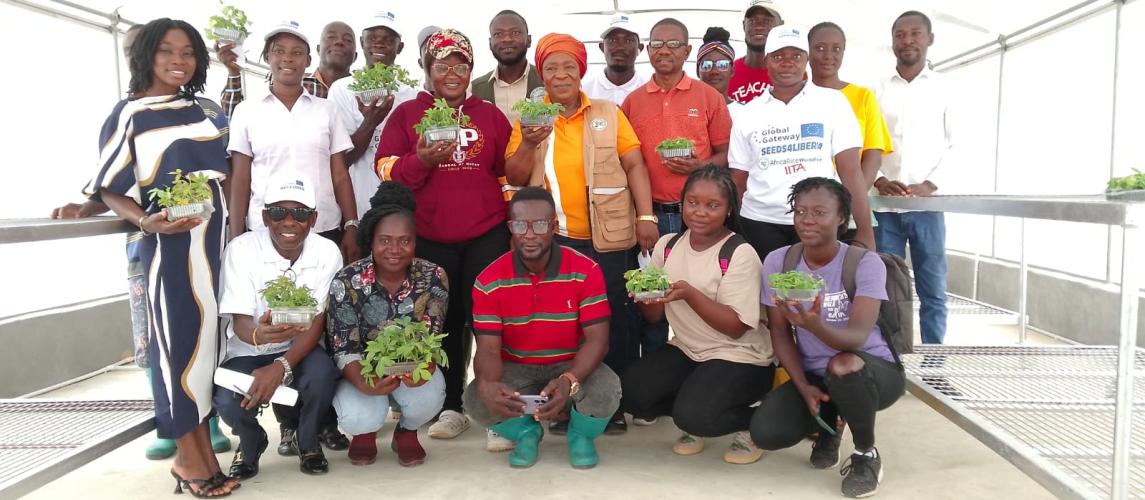
CARI, IITA Commission Revolutionary SAH Technology to Boost Cassava Production in Liberia
SUAKOKO, Bong County – The Central Agricultural Research Institute (CARI), in partnership with the International Institute for Tropical Agriculture (IITA), officially commissioned the Semi-Autotrophic Hydroponics (SAH) technology on June 20, 2025, at CARI headquarters in Suakoko, Bong County. This groundbreaking agricultural innovation promises to transform cassava production in Liberia and other resource-constrained regions by improving yields, reducing water usage, and advancing environmentally sustainable farming practices.
SAH is designed to enhance seed quality, crop productivity, and profitability for vegetatively propagated crops across Africa. In Liberia, the initiative is implemented in collaboration with the Seed Development and Certification Agency (SDCA), at the apex, to ensure that improved cassava varieties reach both male and female seed producers, ultimately strengthening Liberia’s national seed system and improving livelihoods.
Hydroponic tissue culture of cassava is a unique system that involves a combination of tissue culture to generate disease and pest-free, isogenic cassava plantlets in a sterile dish in a controlled laboratory setting. Hydroponics in orienting, cultivating, and reproducing those plantlets devoid of soil through the system of giving nutrient-rich water to them. The purpose is to accelerate the vegetation growth of cassava, make several clear stem cuttings of every plant, and propagate cassava several times more than in the field, up to 60 times per year.
Speaking on behalf of CARI’s Director General, Dr. Arthur Bob Karnuah, the representative expressed deep appreciation to the European Union, AfricaRice, and other development partners for the rollout of SAH technology in Liberia. Mrs. Abibatu T. Kromah, Post-Harvest Specialist and Acting Administrator at CARI, noted the growing demand for infrastructure support. “CARI needs screen houses now more than ever. Considering our progress and direction, strengthening our research environment is essential,” she stated. She emphasized that screen houses are vital to ensuring accurate data collection and analysis.
Echoing similar sentiments, Dr. James S. Dolo, Head of the Crop Program at CARI, recalled the devastating impact of Liberia’s civil wars, which severely damaged research and residential infrastructure, including laboratories and irrigation systems. “Recovering these facilities renews hope and empowers scientists to conduct better, more accurate research,” he said.
Dr. Dolo lauded the European Union as the chief financier of the project and called on additional donors to support the rehabilitation of the two remaining screen houses. The three existing units, each measuring 10 by 20 feet, were originally constructed in 2013 under the World Bank-funded West Africa Agricultural Productivity Program (WAAPP).
To operationalize the SAH technology, IITA and CARI are training 10 interns from Stella Maris Polytechnic University’s College of Agriculture, and seven Research Officers and one Research Assistant who are experts in agronomy, plant pathology, and root and tuber research.
In 2024, seven elite cassava varieties, including No Hunger, Baba 70, Game Changer, TMS-95/0289, TMS-92/0057, TME-693, and Dixon, were introduced to CARI and cultivated on 13.01 hectares. These trial plots serve as a foundation for producing certified breeder seeds that will be distributed to local farmers. The broader goal is to build a resilient seed system supporting cassava, rice, soybean, coffee, and inland fisheries in Liberia.
During the commissioning ceremony, SAH Research Supervisor Ms. Naomi Alabi highlighted the technology’s origins under IITA’s 2016 “Building on Economically Sustainable Integrated Seed Systems” project. Since then, SAH has proven instrumental in producing clean, high-yield cassava planting materials for formal seed systems throughout Africa.
“SAH is a product of cross-disciplinary collaboration. It reflects our collective resolve to deliver solutions that benefit people, the environment, and agricultural economies,” Alabi stated.
She explained that more than five million cassava plantlets have been generated using SAH and used to establish over 200 hectares of breeder seed fields. Fourteen countries have since adopted the technology, supporting 20 operational facilities built through public-private partnerships. Over 150 researchers and technicians have been trained as part of IITA’s sustainable cassava seed system initiative.
SAH’s real impact goes beyond labs and research stations. It has created employment, increased farmer incomes, and contributed to poverty alleviation. Ms. Alabi emphasized the importance of sustained collaboration among government agencies, industry leaders, academic researchers, and the private sector to unlock SAH’s full potential.
The technology itself is a game-changer. By using virus-free in-vitro plantlets in a controlled environment—with carefully managed temperature, growth substrates, and nutrient supply—SAH enables rapid multiplication of disease-free, high-quality cassava seeds. This system supports both breeding programs and large-scale dissemination through germplasm exchange.
In countries like Nigeria, SAH has already spurred the growth of over 2,000 commercial seed entrepreneurs (CSEs), providing farmers with consistent access to improved varieties that offer higher yields and better nutritional value. “We envision a future where Liberia’s cassava seed sector is fully transformed through SAH,” Alabi affirmed.
The Weala cassava processing plant, currently under development in Margibi County, is poised to become a major hub for industrial starch production. But its success hinges on one critical factor: a consistent and sufficient supply of raw cassava.
According to Agriculture Minister Dr. J. Alexander Nuetah, the government is actively encouraging Liberian farmers to expand cassava cultivation to meet the plant’s production demands. Equipment for the facility has already been shipped, and land preparation is underway, with hopes of full operation soon. The Minister reechoed that when completed, the plant would offer a guaranteed buyer for cassava, creating a stable market that can boost farmer incomes and reduce post-harvest losses, scale up cassava production, support Liberia’s goal of reducing reliance on imported staples, and strengthen food sovereignty.
To meet the supply and demand of the hub, farmers will need access to certified, high-yield cassava varieties, improved agronomic practices, and support from extension services. Projects like Seeds4Liberia and CARI’s breeder seed program are already laying the groundwork by multiplying improved varieties such as Game Changer and Baba 70. It’s a pivotal moment. With the right coordination between the government, research institutions, and farmers, Liberia can turn this challenge into a powerful opportunity for agricultural growth.
